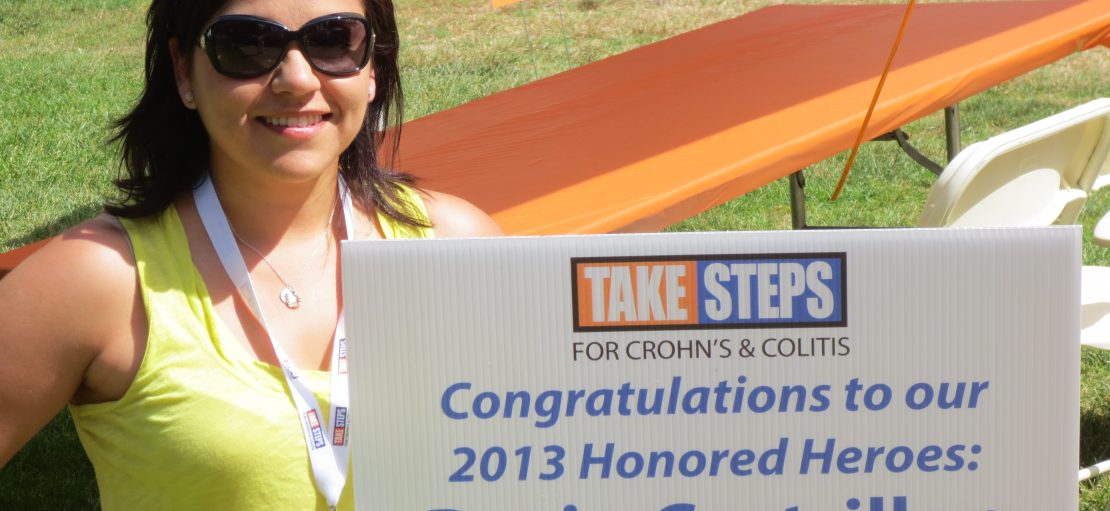Rocio Castrillon is a National Trustee of the Crohn’s & Colitis Foundation. She has been a Crohn’s disease patient since 2003 and involved with the Crohn’s & Colitis Foundation in various capacities since her diagnosis, including as a fundraiser, advocate, mentor, stakeholder reviewer, associate editor and task force member. Ms. Castrillon advocates for the patient voice and openly shares her personal experience of living with inflammatory bowel disease (IBD). Fluent in Spanish and French, and as a Latina IBD patient of Peruvian descent, she is committed to addressing the unique needs of diverse IBD communities and expanding patient accessibility to quality IBD information, resources and research. She joined the ABIM Gastroenterology Board in July 2024.
How did you first get involved with the Crohn’s & Colitis Foundation?

I was living with complications of my disease for five years before I finally received my Crohn’s disease diagnosis in 2008. The following year, I ran a half marathon with Team Challenge, the Crohn’s & Colitis Foundation’s endurance training program, and that’s what brought me to the Foundation. Over time, I got more involved as a volunteer with fundraising, advocating, patient education programs, committees, task forces and more. Since 2017, I’ve been a stakeholder reviewer for the Foundation’s grants committee, which allows me, as a patient, to review IBD research proposals seeking funding and help decide if they are valuable from a patient perspective. I love being hands-on with the research and truly being a decisionmaker on what is being funded. Because I’ve been a stakeholder reviewer for so long, I’ve seen research come to fruition and the impact I’ve had on patient care firsthand.
I want to continue to play a role in what’s coming for the future. Being nominated to the Crohn’s & Colitis Foundation’s National Board of Trustees came as a shock. I recognize that the nomination was a result of the many years I’ve dedicated to the Foundation, my volunteerism and advocacy work with the Foundation, along with my passion as an IBD patient. In addition, my strategic marketing career allows me to bring my professional experience to the Board as well. Not only have I been able to do so much with and for the Foundation, but now I’m helping determine what the Foundation is doing moving forward. It’s come full circle, as I’m so involved, engaged and passionate as a patient, but also now helping support and raise awareness to the millions of people that aren’t aware of what the Foundation offers.
What is most rewarding about your involvement?
What is most rewarding as a patient advocate is really that direct impact—for instance, talking to a patient who’s never spoken to another fellow IBD patient before. Oftentimes, they’re grateful to have someone they can connect with and who understands what they’re going through. It’s also knowing the greater impact I have in helping determine what is being funded and where research is headed. Additionally, as a Latina IBD patient, I recognize there are not many of us patients who are visible. I’m now very outspoken about my disease journey; it’s rewarding to give visibility as a Latina IBD patient.
What made you interested in joining the Gastroenterology Board? What are you hoping to contribute and learn as a patient representative?
As a patient for over 20 years, I have extensive medical knowledge due to the complexity of living with IBD. I know the impact that quality health care can bring to patients, and so I hope to utilize my patient perspective on the Gastroenterology Board. The greater depth and breadth of knowledge a physician has, the better off the patient is. The standards that ABIM has for physicians align with my own beliefs as I personally want the best care possible. I want the doctor to know as much about my condition as I do, especially because we see how quickly the field is moving in IBD—for example, there are medications getting approved and coming to market for patients at a more rapid pace than ever. Ultimately it was the alignment of what ABIM requires of physicians, and what I personally want as a patient, that drew me to the Specialty Board opening.
Because of my involvement with other organizations, I was familiar with ABIM in general, but I didn’t realize exactly what the requirements of certification are. I assumed all physicians were certified, especially in internal medicine, but I was less aware of the specialty certifications. I often encounter patients who aren’t aware of what certification means, and it saddens me knowing that they may not realize the level of care they may or may not be receiving. Unfortunately, that was my situation over 20 years ago when I was much less informed about medical specialties.
What is something you wish more people knew about IBD?
I wish more patients knew they should be seeking a specialized physician who is board certified and qualified to not only properly diagnose them, but also care for them long-term. Patients need to have trust in their physician, and more importantly, confidence that their physician is knowledgeable about their disease.
As for physicians, I think it’s important they understand the cultural implications that inflammatory bowel disease can have, which extend far beyond race and ethnicity. Aside from patients dealing with a challenging physical condition, there’s a lot of stigma and, oftentimes, blame put on the patient with chronic disease. IBD is not always as familiar in other cultures, so the patient is made to feel as if they brought this disease upon themselves. Family also plays such a big role in our lives, and when it comes to medical discussions, we are sometimes influenced by what family thinks versus what the physician thinks. Cultural awareness is an important consideration for physicians to have to address these common concerns.
And, finally, with IBD being a digestive disease, food plays a major role both in disease activity as well as living with IBD. It’s important for physicians to understand not just basic demographic information of a patient’s background, but more importantly who the patient is and how they live, including cultural celebrations or holidays that may revolve around food. If a patient is unable to participate in a cultural festivity that involves food due to their disease activity, it can be challenging. All of that weighs heavily on patients and leads to mental health affects as well.
What’s the ideal physician interaction you look for as a patient with IBD?
I’ve been fortunate to have found that physician-patient relationship since my Crohn’s disease diagnosis. My gastroenterologist knows the ins and outs of my life, career, family and all of my lived experiences with the disease. My first visit with her was comprehensive, and it gave me comfort knowing I was finally in experienced hands. I’d never had a doctor who spent that much time with a patient, and I realize now why IBD specialists need to be so thorough. It was the beginning of what would become an ongoing, trusting physician-patient relationship. She knows I come prepared with a list of questions or discussion topics, so that’s typically how we start the appointment. It’s not only a trusting relationship but it is very focused on shared decision-making. I truly believe that all patients should benefit from similar physician-patient relationship and it is what I strive to advocate for.
What issues are most important to you as you begin your term on the Specialty Board?
For me, it’s sharing my lived experience and the authentic patient voice, along with being able to express the significance of a physician in a patient’s life. When you’re an IBD patient, that relationship is lifelong, and I want to share the impact our physicians have in our lives and how that grows beyond just a physician-patient relationship. Personalized care should be the end goal, and I hope that having patients like myself on Specialty Boards adds that important context.
Increasing IBD awareness is important for me as I begin my term on the Specialty Board as well. The more prepared physicians can be to look for the signs and symptoms of Crohn’s disease and ulcerative colitis will ultimately result in better patient care.



